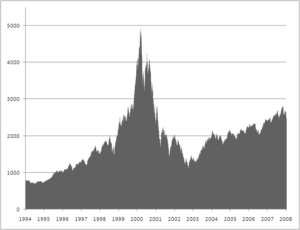LET the rest of the country worry about a double-dip recession. Tech land, stretching from San Jose to San Francisco, is in a time warp, and times here are still flush.
Even now, technology types in their 20s and 30s are dropping a million-plus each on modest ranch houses in Palo Alto in Silicon Valley and Victorian duplexes in San Francisco, and home prices in some parts have jumped nearly 50 percent in the last six months.
Jobs — good, six-figure jobs, with perks like free haircuts and lessons on how to create the next start-up company — are here for the taking, at least for software engineers.
And for anyone with a decent idea and the drive to start a company, $100,000 to get it off the ground is easy to come by.
Yet, for all the outward optimism, even before the recent gyrations on Wall Street, old fears have been creeping in, nagging memories of the dot-com bust. You can sense it at cocktail parties in Menlo Park, at business conferences in Redwood City, inside the hipper-than-thou offices of young Web companies in San Francisco. Maybe, just maybe, these good times won’t last, and it will all come crashing down again.
“There’s this ’90s hangover people still have,” says Peter Thiel, a PayPal co-founder and tech investor.
Now the worry is that all the turmoil on Wall Street will spread West. Can Silicon Valley really prosper if the general economy tips back into a recession? Can you make a fortune on your I.P.O. if the market is falling? Probably not. But then, no one should work here unless she is prepared to be lucky. Even in worrisome moments, like now, the essential optimism of this place endures.
“There’s a ‘greater-fool theory,’ ” says Lise Buyer, who was a tech stock analyst during the dot-com bubble and is back with a consulting firm, the Class V Group, that advises on initial public offerings. “In Silicon Valley, we are as a species wildly optimistic. But if we weren’t, we wouldn’t have so many entrepreneurs because no one who’s being rational would ever found a company.”
And so start-ups are multiplying. Engineers are deciding that this is the right time to create would-be Groupons or Facebooks — “me-too companies,” valley speak for start-ups that are basically copycats of a winning formula — or yet another local, social mobile app.
Even more than buying a new Prius or jetting off to Cabo for the weekend, the new money set here wants to keep investing — and believing. Backing another start-up is a status symbol, the No. 1 splurge, and it captures both the tech industry’s belief in the future and its fear of missing the next big thing.
“These are nouveau tech millionaires,” says Adeo Ressi, a coach for entrepreneurs. “It’s not that they don’t see the warning signs. It’s like roulette.”
Even before the fragility of the stock market became apparent, people here had been asking this question: Are we in a new tech bubble?
Letters
What Kind of Innovation?
Published: September 3, 2011
To the Editor:
I read “In Silicon Valley, the Night Is Still Young” (Aug. 21) with some consternation, though not because I am concerned about another tech bubble inflating. I am concerned because bright young entrepreneurs and engineers, as well as the venture capitalists and their billions, could be spending their time, talents and money to spur innovation in areas of critical need: feeding a growing planet, finding new solutions for energy, and providing health care around the world, to name a few.
Bookmark this page for “Silicon Valley” and check back regularly as these articles update on a very frequent basis. The view is set to “news”. Try clicking on “video” and “2” for more articles.








